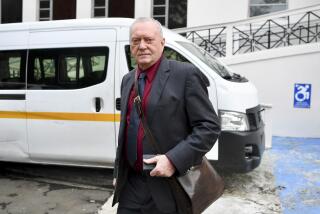Judge Again Rejects Conviction of Keating
- Share via
For the second time, a federal judge threw out Charles H. Keating Jr.’s state securities fraud conviction, ruling Thursday that the trial of the former Lincoln Savings & Loan operator was constitutionally flawed.
The ruling means Keating is once again clear of all convictions, pending an expected appeal.
U.S. District Judge John G. Davies in Los Angeles granted a new petition by the onetime Arizona developer to dismiss the 17-count state verdict. His ruling came only three weeks after an appeals court had reinstated Keating’s conviction.
Keating, who would say only that he was “just thrilled” with his lawyers, appeared solemn during the court hearing, but smiled broadly afterward.
State prosecutors, who had hoped to return Keating to jail today, said they will appeal Davies’ latest decision to the U.S. 9th Circuit Court of Appeals.
“I am more confident than even before that Judge Davies is wrong,” said Deputy Los Angeles Dist. Atty. William Hodgman, lead prosecutor at trial. “I want the victims to know that we will never give up.”
Davies ruled that the trial court wrongly told the jurors they could convict Keating as a direct perpetrator of a fraud, even though there was no evidence that he sold securities himself. Keating’s firm sold nearly $200 million in bonds to about 17,000 customers, mostly elderly Southern Californians.
Keating, who became the symbol of the massive thrift debacle of the 1980s, is once again clear of all criminal convictions. He also has won a new trial on his federal racketeering, conspiracy and fraud conviction, a ruling federal prosecutors have appealed.
Prosecutors “absolutely” expected Davies to overturn the state case Thursday, as he did in April 1996, but were hoping to delay the hearing so they could return Keating to prison today, said Deputy Los Angeles Dist. Atty. Paul Turley.
Davies summarized his findings and decision after hearing arguments from Deputy state Atty. Gen. Sanjay T. Kumar and Keating’s lawyer, Stephen C. Neal.
Neal argued that prosecutors presented the jury with two legal theories, one of them the invalid direct perpetrator theory, and no one could tell which one the jury relied on. That, he said, violated Keating’s due process rights.
Kumar said no evidence showed that Keating directly sold securities to customers. The “only possible” theory on which the jury could convict Keating, he argued, was that he aided and abetted the securities fraud.
Davies first set Keating free from state custody two years ago when he ruled that Keating’s conviction rested on “nonexistent and erroneous legal theory” and “erroneous” jury instructions.
The judge found then that both theories were unconstitutional. But the 9th Circuit reversed on procedural grounds, saying Keating had to go back to state court because he failed to raise an argument on aiding and abetting in his state appeals.
At one time, Keating was the epitome of what regulators and others found wrong with the thrift industry. He was an outspoken critic of regulators and wielded influence that reached throughout Congress and into the White House during the thrift industry’s free-wheeling days in the 1980s.
He used his American Continental to acquire Lincoln Savings in 1984 and take advantage of the then-liberal investing laws in California. Lincoln poured billions of dollars into raw desert land, corporate takeover attempts, foreign currency trading, luxury hotel development and a host of other unconventional investments.
More to Read
Sign up for Essential California
The most important California stories and recommendations in your inbox every morning.
You may occasionally receive promotional content from the Los Angeles Times.













